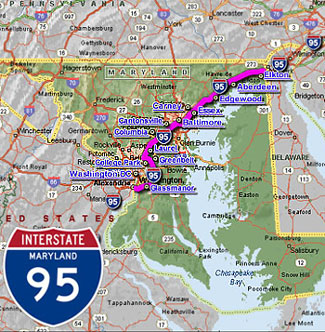- Blacks moving targets for cops (FCN, 06-14-2004)
- Racial Justice: Racial Profiling (ACLU)

Driving down Maryland’s 95 South for Army Lt. William Barry was usually just a cruise from point A to point B. All of that changed May 2, 1996.
“I noticed the state trooper on the side of the road with his emergency lights on. I wasn’t speeding,” Mr. Barry told The Final Call. “Seconds after I passed him, he drove up next to my car, looked at me, then got behind my car, put on the lights and pulled me over.”
“The state trooper asked me for my license and registration. As I was reaching in the glove compartment for my registration, he told me to get out of the car. He asked me if I had any weapons. I said no. Then he asked me if he could search my car.”

When Mr. Barry questioned what would happen if he said no, he was told that he would be subject to arrest.
“When it was over, the trooper gave me a ticket for failing to display my registration even though he didn’t give me enough time to get it.”
After more than a decade of fighting for justice on behalf of men and women like Mr. Barry who were racially profiled on Interstate 95 in Maryland, the American Civil Liberties Union, the ACLU of Maryland, and the law firm of Hogan & Hartson, LLP announced April 2 that a landmark settlement was reached with the Maryland State Police to end the long running “driving while Black” lawsuit.
The agreement provides substantial damages to the individual plaintiffs, a requirement that the state police retain an independent consultant to assess its progress towards eliminating the practice of racial profiling, and a joint statement by the parties condemning racial profiling and highlighting the importance of taking preventative action against the practice in the future.
“More than 12 years after being wrongfully pulled over, harassed, and humiliated on I-95 in Maryland, I can finally tell my son that justice is possible when your rights have been violated in America,” said Gary Rodwell, a plaintiff in the lawsuit and vice president of the ACLU of Maryland.
“This long chapter in our lives is over, but if this settlement prevents someone else from being targeted based on race, it was worth it.”
The settlement, which totals more than $400,000, includes a $300,000 payment by the state of Maryland for damages and legal costs. It also includes a commitment by state police to pay up to $100,000 to retain an independent police practices consultant to perform an assessment of how the agency has implemented changes to policy and practices to address concerns about racial profiling, related to a far-reaching legal agreement reached in 2003 to resolve major portions of the case.
“It’s a good settlement,” explained Reggie Shuford, senior staff attorney for the National ACLU Racial Justice Program.
He told The Final Call, “The Maryland State Police have always denied racial profiling in this case. The judge disagreed and said that the statistics say otherwise. They’ve agreed to a lot. Between the monetary settlement and the policy change, it’s a national model that people can look to on how to handle similar cases. ”
Under the agreement, state police will produce all policies, training materials, and general orders issued pursuant to the 2003 consent decree and, subject to court approval, all racial profiling complaints filed with the agency since then.
The lawsuit was filed originally in 1998 by William Mertens, Jeon of the ACLU of Maryland and Mr. Shuford on behalf of individual plaintiffs Verna Bailey, William Berry, Kenneth Jeffries, John Means, Gary Rodwell, and Johnston Williams and the Maryland State Conference of NAACP Branches.
In 2005, the ACLU began working with pro bono attorneys from the law firm Hogan & Hartson LLP’s Washington and Baltimore offices, who took the lead in litigation on behalf of the individual plaintiffs.











